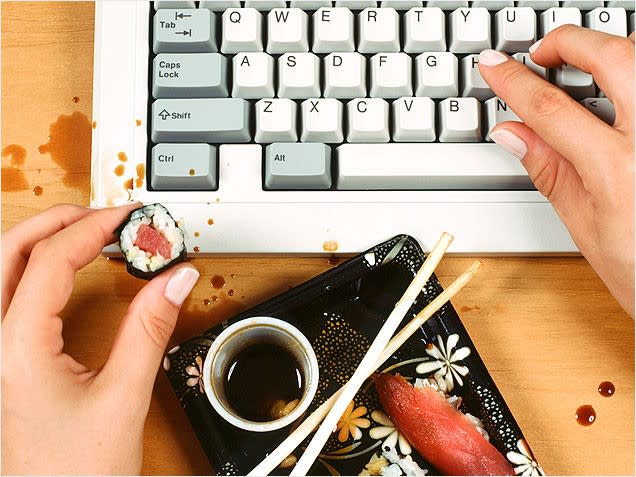Diet Mistakes Even Smart Women Make
By Norine Dworkin-McDaniel
These smart solutions will help you stay on track
1. Multi-Tasking While You Eat
We pride ourselves on being able to juggle several things at once, but treating meal time like one more thing to cross off the To Do list can lead to overeating. Why? "There's no satisfaction," explains Jamie Dougherty, a San Francisco health and lifestyle coach. "We end up mowing through whatever is on our plate, but we don't reme mb er eating so we tend to eat more."
Fast Fix: Disconnect from the electronics when you're ready to eat. "Even if you have to stay at your desk, shift your chair so you're not looking at your email," says Dougherty. "Our bodies want to have a sense of acknowledgement and satisfaction, and we don't get that when we don't use all of our senses to engage with our food."
2. Snacking On 100-Calorie Snack Packs
Snack packs are tempting because they seem like a way to indulge in junk food without cheating on your diet. After all, 100 calories is nothing. But with these snack packs you really do get "nothing" because they're absolutely devoid of nutrition, says Chicago personal trainer Stephanie Mansour. "We've come to think of snacks as sugary, salty treats, but they're actually meant to help us fit in all of the recommended servings of produce, dairy and grains - things we don't get at meals," says Mansour. "That's why you want to choose snacks that contribute to your nutritional needs and don't just provide sugar and sodium. Those kinds of foods cause wild swings in blood sugar that can leave you feeling hungry again fairly quickly. That leads to even more snacking, which can end up sabotaging your weight loss efforts."
Fast Fix: Make your own healthier portable snacks - two a day are ideal -- from fresh whole foods, suggests Mansour. Good choices: Peanut butter on celery or a hard-boiled egg.
3. Swapping Ice Cream For Frozen Yogurt
Frozen yogurt's lower in calories and fat than ice cream -- how can that be bad? That's exactly how we get lured into the new frozen yogurt bars that have sprouted up recently, offering dozens of flavors and toppings, cautions New York City registered dietitian Sharon Richter. "Usually, the calorie amounts on display at these places are for a small (3-ounce) serving of plain vanilla yogurt," she explains. If you believe you've got extra calories to play with and then fill a container with higher-calorie flavors like chocolate or peanut butter and top it off with crushed cookies and chocolate syrup, you can actually end up with a lot more calories than anticipated.
Fast Fix: Stick with a small portion - even a kid's cup -- of vanilla or "original" unflavored yogurt, Richter advises. "This will keep the calories close to what's usually displayed for a 3 ounce serving," she says. "If you want toppings, just add fresh - not syrupy - fruit, like berries, which are lower in sugar and calories than candy toppings."
4. Eating Six Small Meals A Day
Where the small, frequent meal advice becomes a trap is the size of the meal, says Reyna Franco , MS , a registered dietitian and personal trainer in New York City . Small is in the eye of the dieter. Rather than divvy up the calories of three regular meals into six smaller portions about 250 to 350 calories apiece, "people actually have six full-size meals and end up overeating," says Franco.
Fast Fix: "Use a calorie-tracking app so you can see how many calories you're actually eating," suggests Franco. Try: MyFitnessPal, a free app that works on iPhone, Android and Blackberry smart phones.
5. Snacking On Sports Nutrition Products
These are "nutrition products" so they must be healthy, right? Not so fast, says Jessica Herschberg, a certified personal trainer in Nashville . Sports nutrition products -- like gels, energy bars, even jelly beans with extra electrolytes -- aren't meant to tide you over between meals. They're meant to keep elite athletes going during intense workouts. "People think of these things as `health foods,' but they're actually very concentrated sources of sugar and carbohydrates. They're not meant to be nutritious. They're meant to be fast-burning fuel for the long, intense training sessions needed to prepare for marathons," she explains. When those carbs aren't burned during a workout, she adds, "They get stored as fat."
Fast Fix: Reach for snacks with a healthier balance of protein, healthy fat and carbs, like nuts and raisins, apple and cheese slices. Snacks like these, says Herschberg, are digested more slowly so they'll hold you between meals and won't get stored as fat like excess carbs.
Plus, see more diet mistakes we often make.
More from iVillage
11 Surprising Foods For Weight Loss
100 Sweet Treats Under 200 Calories

